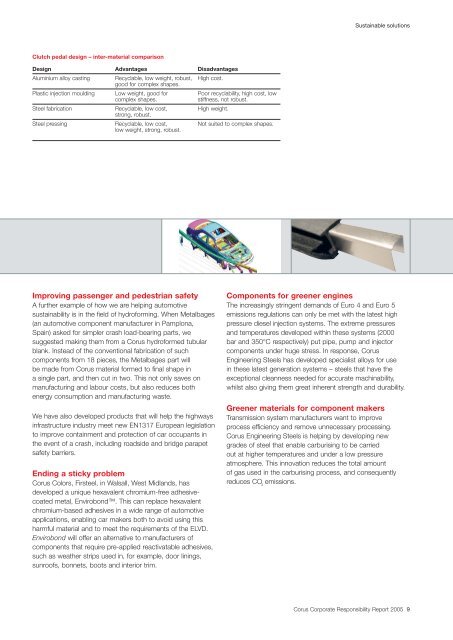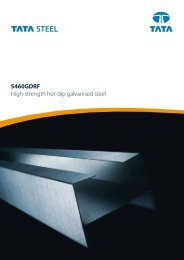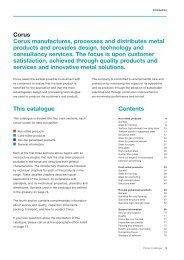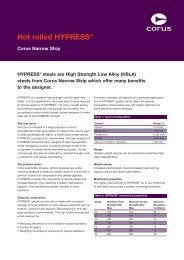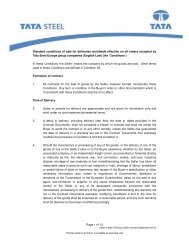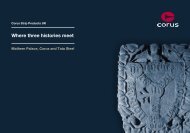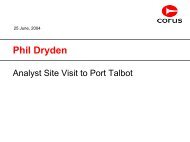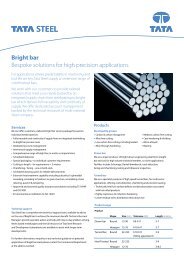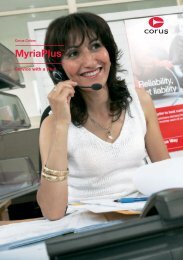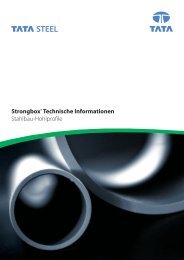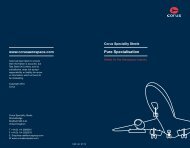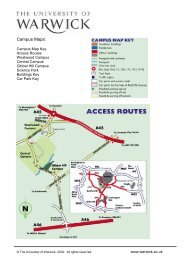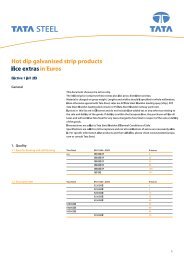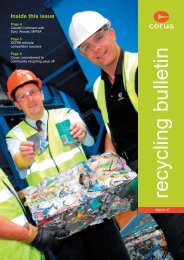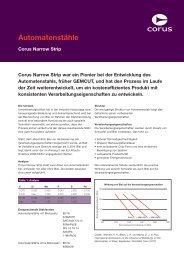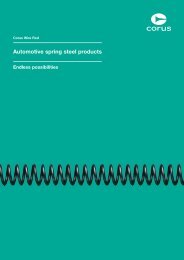Corporate responsibility report 2005 - Tata Steel
Corporate responsibility report 2005 - Tata Steel
Corporate responsibility report 2005 - Tata Steel
Create successful ePaper yourself
Turn your PDF publications into a flip-book with our unique Google optimized e-Paper software.
Sustainable solutions<br />
Clutch pedal design – inter-material comparison<br />
Design Advantages Disadvantages<br />
Aluminium alloy casting Recyclable, low weight, robust, High cost.<br />
good for complex shapes.<br />
Plastic injection moulding Low weight, good for Poor recyclability, high cost, low<br />
complex shapes.<br />
stiffness, not robust.<br />
<strong>Steel</strong> fabrication Recyclable, low cost, High weight.<br />
strong, robust.<br />
<strong>Steel</strong> pressing Recyclable, low cost, Not suited to complex shapes.<br />
low weight, strong, robust.<br />
Improving passenger and pedestrian safety<br />
A further example of how we are helping automotive<br />
sustainability is in the field of hydroforming. When Metalbages<br />
(an automotive component manufacturer in Pamplona,<br />
Spain) asked for simpler crash load-bearing parts, we<br />
suggested making them from a Corus hydroformed tubular<br />
blank. Instead of the conventional fabrication of such<br />
components from 18 pieces, the Metalbages part will<br />
be made from Corus material formed to final shape in<br />
a single part, and then cut in two. This not only saves on<br />
manufacturing and labour costs, but also reduces both<br />
energy consumption and manufacturing waste.<br />
We have also developed products that will help the highways<br />
infrastructure industry meet new EN1317 European legislation<br />
to improve containment and protection of car occupants in<br />
the event of a crash, including roadside and bridge parapet<br />
safety barriers.<br />
Ending a sticky problem<br />
Corus Colors, Firsteel, in Walsall, West Midlands, has<br />
developed a unique hexavalent chromium-free adhesivecoated<br />
metal, Envirobond. This can replace hexavalent<br />
chromium-based adhesives in a wide range of automotive<br />
applications, enabling car makers both to avoid using this<br />
harmful material and to meet the requirements of the ELVD.<br />
Envirobond will offer an alternative to manufacturers of<br />
components that require pre-applied reactivatable adhesives,<br />
such as weather strips used in, for example, door linings,<br />
sunroofs, bonnets, boots and interior trim.<br />
Components for greener engines<br />
The increasingly stringent demands of Euro 4 and Euro 5<br />
emissions regulations can only be met with the latest high<br />
pressure diesel injection systems. The extreme pressures<br />
and temperatures developed within these systems (2000<br />
bar and 350°C respectively) put pipe, pump and injector<br />
components under huge stress. In response, Corus<br />
Engineering <strong>Steel</strong>s has developed specialist alloys for use<br />
in these latest generation systems – steels that have the<br />
exceptional cleanness needed for accurate machinability,<br />
whilst also giving them great inherent strength and durability.<br />
Greener materials for component makers<br />
Transmission system manufacturers want to improve<br />
process efficiency and remove unnecessary processing.<br />
Corus Engineering <strong>Steel</strong>s is helping by developing new<br />
grades of steel that enable carburising to be carried<br />
out at higher temperatures and under a low pressure<br />
atmosphere. This innovation reduces the total amount<br />
of gas used in the carburising process, and consequently<br />
reduces CO 2<br />
emissions.<br />
Corus <strong>Corporate</strong> Responsibility Report <strong>2005</strong> 9


